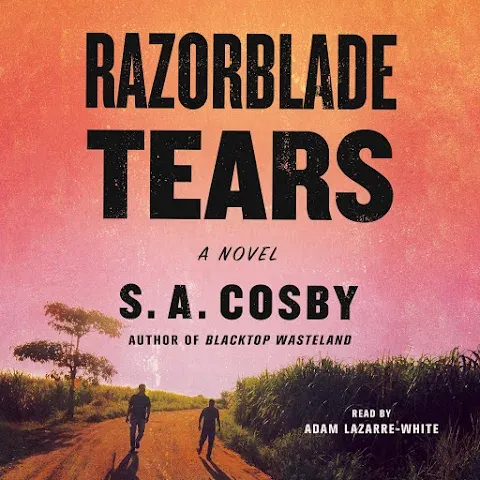November Reviews: Gratitude

Razorblade Tears by S.A. Cosby, & Valentine by Snail Mail, & Screenwriter Mark David Rosenthal, & Write. Publish. Repeat. The No-Luck-Required Guide to Self-Publishing Success

BOOK: Razorblade Tears by S.A. Cosby

There is nothing more North American than crime fiction and there is no better living writer of crime fiction than S.A. Cosby. The first few chapters of Razorblade Tears were so emotional and right that my eyes stung. If you can find a better opening in a crime novel, please let me know.
The story is simple: When their gay sons are murdered in a professional execution, a Black ex-con, Ike Randolph, and a white alcoholic, Buddy Lee, team up to avenge their deaths and in doing so, face their own pasts, their parenting failures, and the homophobia that led them to reject their sons when they were alive.
Of course, this is a crime novel so trigger alerts and all that: this is a violent book and, at times, the violence can be more than sobering and in more than a few places the mayhem borders on horror. But underneath it all, this is a writer who is trying to get somewhere to get at some things, and if he has to take you on a dark dirt road to get there, well, keep your head down and walk fast.
Whenever I thought S.A. Cosby had gone too far, he would forcefully remind me of the character's motivations behind the action. I have never read it done better.
I am now rereading the trade-size paperback after listening to the audiobook on Audible. I wrote and produced a few audiobooks and I have always resisted the reader who takes on the voices of male and female characters. I would rather just hear the book read and let my mind do the rest, but I was completely taken by the incredible performance by the actor Adam Lazarre-White as he read Razorblade Tears. There is not a false note in this reading.
S.A. Cosby may not be for everyone, but for fiction writers and fans of crime novels, he shows us how contemporary crime fiction can pulse with heart and soul.
MUSIC: Snail Mail
It is uncanny how good Lindsey Jordan is with melody and lyrics. In this video from NPR's Tiny Desk Concert, she had just graduated from high school. She is playing with the core of her live band: the bass player Alex Russell and the drummer Ray Brown. As she says in this video, she is used to playing loud and live.
Their new album Valentine is superb. Their first EP was Habit followed by the album Lush. Both are excellent, but I am not alone when I say that when Snail Mail plays live they are at another level. Do yourself a favor and listen to this entire live broadcast here:
Check their website for their touring schedule: <snailmail.band>. I do not think it is coincidental that the band members were inspired by the D.C. and Baltimore punk music scene where they grew up. This is the area where the "Straight Edge" music scene was born in the 70s. The band members all have solid live music roots and they will only get better. Quality live music is in good hands with Snail Mail. As one comment reads on YouTube, "The future of Rock and Roll is here."
INTERVIEW: Screenwriter Mark David Rosenthal
"I realized the script is not for shooting; it’s at first a tool for selling." - Mark David Rosenthal
I have known Mark David Rosenthal's writing for years. He is a true Hollywood survivor.
Rosenthal has been married to the medical professional and amateur botanist Kim Rosenthal for 30 years. Together they raised two talented children (in order of appearance): writer Harry Rosenthal and music composer Hayley Rosenthal. He is a milk-chocolate connoisseur, a daily hiker in the Santa Barbara hills, a voting member of the Academy, and an Emmy-nominated writer for the 2016 version of "Roots." His career has been featured in "Tales from the Script: 50 Hollywood Screenwriters Share Their Stories" and in "Why We Write: 25 Top Screenwriters Share Their Stories."
Mark Rosenthal's credits include: "Mona Lisa Smile," "The Jewel of The Nile," "Tim Burton's Planet of The Apes," "Flicka," "For Love or Money," "Superman IV," "Star Trek VI," "Mighty Joe Young," "The Beverly Hillbillies," "Desperate Hours," "Mercury Rising," and "The Legend of Billy Jean." In television, he was the writer and executive producer of "Roots: 2017" for which he received a Prime-Time Emmy nomination.
He is currently writing "Dr. Spock" with Thomas Maier. He just finished the official film story of the 1973 "Wounded Knee" siege with Robby Romero. He is also developing the TV Series "Tribe" with Gale Anne Hurd, and developing an international TV series in Spanish and English.
Dan: I had the pleasure of reading some of your early screenplays. I remember being knocked out by the emotional impact of your spec script for "The Legend of Billy Jean." It did not surprise me when it was purchased. How did you develop your writing style in the beginning?
Mark: I came to L.A. knowing no one and never having read a single script. I became a script reader at the newly formed Orion Pictures and then for the director Mark Rydell. After two years of reading a thousand scripts, I got it. I decided to spec a script after I found a very cool idea hidden in the back of the NYTimes (it became The Legend of Billie Jean). But I also decided to change some of the conventional script formats that annoyed me. Dropping all the mechanics of shooting to improve the reading: removing scene ‘continued's', or location slug lines, all to keep the focus on the story. I also picked up on the very new stylistic choice of adding internal psychology to the description instead of simply doing scene blocking. Writers like Shane Black were leading the way. In a sense, it was addressing the executive/reader/buyer. I realized the script is not for shooting; it’s at first a tool for selling.
Dan: You have been hired to re-write entire films as they enter production. What can you share about some of those high-pressure adventures?
Mark: There were many, some un-credited, like "I, Robot," and the reboot of "The Poseidon Adventure." But the most surreal and euphoric experience was getting a call six weeks before shooting started on Tim Burton's "Planet of The Apes" while they were building sets. They had thrown out the script which hadn't been shown to the cast or crew yet. We started from scratch and worked as the cast screamed to see a script. Working with Tim and the late producer Richard Zanuck under immense pressure was one of those magical experiences that make this difficult lifestyle worthwhile. It was chaotic and inspiring. (The other thing I loved is that Tim and Dick let us work a political allegory into the script that very few people got. Only the legendary NYTimes op-ed writer Maureen Dowd spotted it and wrote a hysterical acknowledgment.
Dan: There are hundreds of people out there selling methods to writers promising to get them into the film industry. A quick Google search brings up over 61 different MFA screenwriting programs. You have a Masters and a Doctor of Arts degree. How important is formal education for a beginning screenwriter?
Mark: My degrees are in Middle English and Literature. I never studied screenwriting. Ever. I say read a thousand scripts and take an acting class or two. A directing class. Then start writing. Film school is only worthwhile if you’re going to use this four-year hiatus from reality to either learn a technical skill or make a film to sell. Otherwise, it’s bullshit. Get a medical degree.
Dan: I have to ask this because you have been doing this for almost 40 years now and have seen the industry change. What would you do if you were starting out today and wanted to write for film?
Mark: If I could write true comedy, which I can’t, I’d write spec comedy scripts. Great comedy writers are always in demand. Because it’s the hardest kind of writing. It’s harder to write hulu’s new comedy series "Reboot" than "Schindler's List." That is my defiant opinion. For everyone else, you have to spec a great script, not a ‘good’ script. A script that must be made. Otherwise, I’d write IP: a novel, short story collection, or graphic novel, and then retain the rights to adapt it. The instant you take a penny from a production company, your life will be miserable.
Dan: Such great information. Thanks for taking the time for this interview.
Mark: Have you tried this Italian Milk Chocolate? It's unbelievable.
WRITING TOOLS: "Write. Publish. Repeat. The No-Luck-Required Guide to Self-Publishing Success" by Sean Platt and Johnny B. Truant with David Wright
Write. Publish. Repeat. The No-Luck-Required Guide to Self-Publishing Success by Sean Platt and Johnny B. Truant with David Wright (WPR) is a self-promoting and somewhat maddening book, but it covers self-publishing better than similar books out there. It is chatty at times but exhaustingly comprehensive. In fact, this book has been imitated many times in many forms by other writers attempting to piggyback on the success of this Amazon bestseller. (There are many books out there with copycat titles.)
It's no secret that I support self-publishing when it is done right. I grew up on the DIY ethos of SF punk rock and poetry at a time when if three writers got drunk together at night they were sure to launch a new literary magazine in the morning.
As for the stigma of self-publishing, history does not care whether a work was self-published at first or not. Whitman. Twain. Melville. The list of important writers who self-published is extensive even without including the writers who started small presses so they could self-publish sideways.
Great books can still find great "mainstream" publishers and editors, but it is obvious that the days when the owners of a publishing house could be counted on to support democracy are gone. I will address who owns what "mainstream" publishing corporation in a later article. I will only say that I would personally check who owned any imprint that was offering to publish my work. I will assume that as a writer believing in freedom of expression you are not interested in helping the owner of Fox News, for example, spread his influence further or allow him to pretend he is fair-minded.
I recommend the Audible version of this book. I did other things while listening and the self-promotion was easier to take when I was not holding the book in hand.
The first thing I have to emphasize is that this book concentrates on genre fiction and genre fiction mash-ups. It is absolutely focused on the business of successful self-publishing and strongly suggests you choose what to write to make sure your books are successful in your chosen genre. It's fiction writing as a business. It is as if Roger Corman got into self-publishing instead of producing B films.
This book was published in 2014, but it is not dated, and in fact it is important to see what these authors have done since. They have expanded their business to include teams of other writers they publish. They changed the name of their company and it now resembles a small film production studio that churns out fiction as Intellectual Property they own and protect.
They also seem to be experiencing some growing pains as their podcast reviews reflect dissatisfaction with their recent content. Managing growth seems to be an ongoing problem, but this can be a good problem to have.
I include an interview with the writers of this book as they offer a course based on the book.
I took the course. It was well worth the money.
In summary, if you are considering self-publishing, these writers provide a good place to start your education. After that, it is up to you to find other sources of current information such as podcasts, blogs, and indie YouTube channels. The business is slippery--same as it ever was.
(Please take a moment to subscribe. Book, music, & screen reviews & interviews, & fiction are in play monthly at dandomench.com --a forever free secure site with the highest standards of privacy available. Your free login is your email and name--the only information the site retains. Your participation is not public. You are never tracked or your email shared. Please contribute if you can. Your payment information is never stored here. Add this website to your address book so we can stay in touch. You can contact me at dandomench@gmail.com. I will respond as quickly as possible.)
